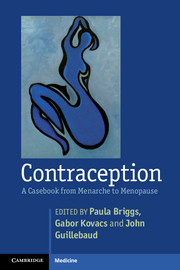Book contents
- Contraception
- Contraception
- Copyright page
- Contents
- List of contributors
- Foreword
- Preface
- 1 Whatwomen want from their contraceptives… and what we can offer
- 2 Mythsand misconceptions about sex and con(tra)ception
- 3 Thehistory of contraception
- 4 Physiologyof the menstrual cycle and natural family planning
- 5 Theoestrogen component of currently used steroidal contraceptives
- 6 Therisk of oestrogens in contraceptives
- 7 Progestogensused in contraceptives
- 8 Thecontraceptive consultation
- 9 Menarcheand associated problems
- 10 Adolescence:contraception in the teenage years
- 11 Contraceptionin the20-somethings
- 12 Contraception in the 30-somethings
- 13 Contraceptionin the 40-somethings
- 14 Contraception in the50-somethings
- 15 Whatis the risk of cancer with hormonal contraception?
- 16 Newdevelopments in female sterilization
- 17 Malesterilization
- 18 Emergency contraception
- 19 Sexuallytransmissible infections and pelvic pain: what you really need to know
- 20 Medicaltermination of pregnancy
- 21 Surgicaltermination of pregnancy
- 22 Primary care treatment of subfertility and what every health professional needs to know about assisted reproductive technology
- 23 Sexualassault
- 24 Future developments incontraception
- Index
15 - Whatis the risk of cancer with hormonal contraception?
Published online by Cambridge University Press: 05 August 2013
- Contraception
- Contraception
- Copyright page
- Contents
- List of contributors
- Foreword
- Preface
- 1 Whatwomen want from their contraceptives… and what we can offer
- 2 Mythsand misconceptions about sex and con(tra)ception
- 3 Thehistory of contraception
- 4 Physiologyof the menstrual cycle and natural family planning
- 5 Theoestrogen component of currently used steroidal contraceptives
- 6 Therisk of oestrogens in contraceptives
- 7 Progestogensused in contraceptives
- 8 Thecontraceptive consultation
- 9 Menarcheand associated problems
- 10 Adolescence:contraception in the teenage years
- 11 Contraceptionin the20-somethings
- 12 Contraception in the 30-somethings
- 13 Contraceptionin the 40-somethings
- 14 Contraception in the50-somethings
- 15 Whatis the risk of cancer with hormonal contraception?
- 16 Newdevelopments in female sterilization
- 17 Malesterilization
- 18 Emergency contraception
- 19 Sexuallytransmissible infections and pelvic pain: what you really need to know
- 20 Medicaltermination of pregnancy
- 21 Surgicaltermination of pregnancy
- 22 Primary care treatment of subfertility and what every health professional needs to know about assisted reproductive technology
- 23 Sexualassault
- 24 Future developments incontraception
- Index
Summary
Keywords
- Type
- Chapter
- Information
- ContraceptionA Casebook from Menarche to Menopause, pp. 132 - 141Publisher: Cambridge University PressPrint publication year: 2013

